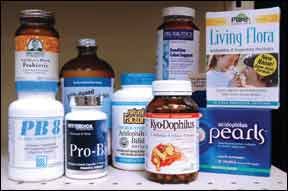Probiotics are beneficial bacteria that live in the digestive tract. There are a variety of different species belonging to genera that include Lactobacillus, Bifidobacterium, Streptococcus, and Enterococcus (often abbreviated by first initial only in names). Some species, such as Lactobacillus, live primarily in the small intestine, while others, such as Bifidobactera, reside in the large intestine (colon).
The Benefits of Probiotics
All dogs can benefit from probiotics, which aid digestion and modulate the immune system. Probiotics produce short-chain fatty acids (SCFAs), which inhibit the growth and activity of harmful bacteria, such as E. coli, Salmonella, and Clostridium perfringens, as well as providing other benefits to the intestines. Human studies have documented the effectiveness of certain strains in treating diarrhea, irritable bowel, and intestinal inflammation (fewer studies have been conducted on dogs). Probiotics may help prevent urinary tract infections, and can even reduce allergic reactions by decreasing intestinal permeability and controlling inflammation.
Species with specific strains known to benefit dogs include Enterococcus faecium (strain SF68) and Bacillus coagulans. Bifidobacterium animalis (strain AHC7) has been shown to reduce the time for acute diarrhea to resolve in dogs. Certain strains of Lactobacillus acidophilus improve frequency and quality of stools in sensitive dogs. Lactobacillus rhamnosus strain GG (LGG) is effective in preventing and treating diarrhea in humans, and may benefit dogs as well. Probiotic products may contain one or several strains.
Cautions: Some probiotic species require refrigeration in order to remain viable; follow label recommendations for storage. It’s questionable how many survive passage through stomach acid into the digestive tract, and whether they then colonize or must be continually replenished.
Many products, particularly those that are not refrigerated, contain fewer live organisms than their labels claim. Freeze-dried probiotics may last longer than refrigerated or other powdered products, especially if the powder is exposed to moisture (such as when the container is opened and closed). Probiotics in commercial foods may not survive processing or storage. Probiotic products should always provide an expiration date.
Dosing Probiotics for Dogs
Probiotics are measured by colony forming units (CFUs). Few studies have been done to determine effective dosages, but these numbers are usually in the hundreds of millions or higher. If probiotics are being used to help with digestion, they should be taken with meals, but otherwise they may survive better if given between meals, particularly if taken with liquid that helps to dilute stomach acid and move them more quickly into the digestive tract (maybe give them after your dog takes a big drink). Probiotics may be given short-term or long-term.
When using products intended for dogs, follow label suggestions for dosage. When using human products, give the full dosage to dogs weighing 40 pounds or more. Reduce the dosage for smaller dogs or if you see loose stools.
Best Probiotics for Dogs:
Examples of canine probiotic formulas that include strains known to benefit dogs:
1. Thorne Research’s Bacillus CoagulansVet
2. Jarrow’s Pet Dophilus
3. Vetri-Science’s Vetri-Probiotic
4. Nusentia’s Probiotic Miracle
5. Purina’s Fortiflora
Several people whose dogs have serious digestive disorders, including small intestinal bacterial overgrowth (SIBO), have told us of success using Primal Defensewith homeostatic soil organisms, made by Garden of Life. Products made for humans can also be given to dogs. Yogurt and kefir with live cultures often contain lactobacillus acidophilus, and sometimes other species as well, but dosages are usually lower than those in supplements.
PROBIOTICS FOR DOGS: OVERVIEW
1. Give your dog a probiotic supplement that offers a variety of strains of beneficial bacteria.
2. Nourish those “good guy” bacteria with a prebiotic supplement.
3. Monitor your dog’s weight, the condition of his coat, his energy level, and the quality of his daily stool for signs that his diet needs to be adjusted in some way. What works well for some dogs may not benefit another dog in other circumstances.
Mary Straus is the owner of DogAware.com. Straus and her Norwich Terrier, Ella, live in the San Francisco Bay Area.







My dog is a 13 tr old 35 lb insulin dependent diabetic. Would there be any problem giving her probiotics ?. If not how many servings or doses is in a container of probiotics ?
Giving your dog probiotics every meal for the rest of its life i recommend IMMEDIATELY! Also switching to a balanced raw diet even or partially cooked diet will most likely rid your dogs diabetic symptoms including its dependence on insulin. I lost my dog way too early to cancer he was a wonderful shitzu. Now 2 years after Samules death i have a Jack Russell i noticed he was eating grass just like Samuel did. Fonzi is only 2, Samuel was 13 so i researched. And essential enzymes …are essential indeed. If you dont change anything accept sprinkling some probiotic supplements on your dogs food it will benefit. But i recommend doing some homework on how kibble dog food is KILLING our animals.
Much love good luck
Sunny
I’m sorry, but this information is incorrect. Diabetes in dogs cannot be fixed by diet, nor can dependence on insulin. Please read my articles on diabetes for more info:
https://www.whole-dog-journal.com/health/diseases/managing-diabetes-in-dogs/
https://www.whole-dog-journal.com/health/diseases/help-manage-your-dogs-diabetes-through-proper-diet/
In response to the original question, there is no problem with giving probiotics to diabetic dogs. the number of servings will vary by product but should be listed on the label.
Thank you for your reply. As an insulin diabetic myself I know that nothing will cure diabetes but some things will help a diabetic live longer.. Your articles are top of the line advice.. Thank you so much.. My vet said You know what your saying 🙂
Hi Sunny. What probiotics and or enzymes do you give your dog? Thank you
I have given my dogs powder Probiotics for years – I give each a teaspoon in their morning food. I know it helps because they do not have that yeasty smell many dogs have. And they are healthy. I also give them sardines twice a week in their food.
Gabrielle, what probiotic do you give your dogs? Thank you
Hi, I have a Shnoodle (poodle + schnouzer) 2 year old. For the last 1 year we have been having massive issues with itching ears. She has been treated at least 7 times and even been put on pred (steroids) to no avail. She also goes at her paws non stop, but the ears are my concern as it gets inflamed and bleeds too, she seems so uncomfortable.
She eats white dog salmon fish but for dinner she has rice with chicken and veges (not salts or flavoring added).
What would you recommend for her, and should I try probiotics. She is apart from that a very happy and active dog.
Hi, I do not know if your dog is still having itch problems but I found that with my dog he was itching as welI from eating chicken. I read that they could be allergic to chicken or a certain meat source if they have skin problems and have switched my dog to eating beef and his itching has gone away. You would first have to slowly introduce the new meat source into your dog’s diet to not cause digestive upset so your dog’s body learns to digest it since it is new to its system.
Ditch the chicken. Go for a limited ingredient food. A raw food diet can help itchy pups. Probiotics, yes. And if those don’t help explore a daily allergy med. I know, a med. But as with humans when you do all you can with lifestyle changes then medication is a smart next step.
Hi There, do you recommend human probiotics or specific animal probiotic?
I list recommended probiotics in my article. Human supplements are often better quality, but may not have the best probiotic strains for dogs. They won’t be harmful but may not be as helpful as the strains we know benefit dogs.
i make homemade greek yogurt. Would that also be good for my standard poodle?
Yes, as long as it agrees with him (any individual dog can have a problem with a specific food).
My 2.5 yr. old Australian Cattle Dog is healthy as can be; normal coat, not too itchy, normal size and has a normal stool most days (2x per day). We feed him Purina Pro Plan, 1 cup twice a day, and normally a small bite or two of whatever cooked protein my wife and I are eating for dinner as a treat (very minimal though). He has been through a couple of families (100% here to stay with us though now) due to his high energy and mildly aggressive protective nature. We are taking him to a trainer and one of their “requirements” is that we get the dog on a probiotic. They said that the probiotics will mellow dogs out and make them less aggressive – the trainer swears by using them. While we are not altogether against the idea, we don’t want to throw off his natural digestive balance, which seems to be about as good as can be right now. Do you have any advice for us?
Jason, while I disagree with your trainer’s insistence on the use of probiotics, they’re unlikely to cause your dog any harm or upset his digestion. If concerned, start with a smaller than recommended amount and work up gradually.
My 11 year old spayed GSD has a hooded vulva which she has been licking non stop. Our veterinarian has prescribed the Chinese herb blend Concentrated Eight Righteous and Ketoseb+PS wipes. She also recommended we give her a probiotic. Which probiotic is right for this issue?
If this is a change in behavior, it likely indicates an infection of some kind. It might be a urinary tract infection, or it might be a skin infection. The wipes your vet gave you are for treating bacterial or fungal skin infections. If the problem doesn’t go away quickly, your vet may need to do a urinalysis (and maybe a urine culture, since about 20% of UTI’s won’t show up on urinalysis alone). Your dog may need antibiotics and/or antifungal drugs in addition to the topical skin treatment. I doubt that any probiotics will help unless the underlying infection is properly treated. It won’t hurt to give them, but I have no idea which might be best.
This study says, “Probiotics have also been evaluated in two veterinary studies to determine if the vaginal microbiota is different in dogs with recurrent UTI, and if oral probiotic therapy could change the vaginal microbiota. No difference was found between groups and oral therapy had no effect on resident flora. More studies are needed to determine the role of probiotics in dogs with recurrent UTI.”
https://www.mspca.org/angell_services/recurrent-canine-urinary-tract-infections/
My dog had a hooded vulva, we used the wipes and cranberry to prevent UTIs until we saved the 800 dollars needed to get a surgery to remove the hood. The surgery was easy and solved the problem, I highly recommend this if it’s an option for you. No more worries about UTIs after that!
I foster many dogs (7 weeks to 14 years and all sizes) and want to put them on a probiotic after they are done with their medications. Example worming meds or antibiotics from infections or surgeries. Is there a good probiotic for all ages and sizes?
Paula, I don’t recommend any specific products, as there is too little research done to know which ingredients, or which products, are best. You can see any updates to this article on my website:
http://dogaware.com/articles/suppsdigestive.html#probiotics
My 10 yr old maltese rescue has a huge amount of red staining around her mouth and some on her paws. As well as down her chest from drooling. She has no teeth and even part of her lower jaw has disappeared. All due to severe infections. As well when she was found on the street she had severe gangrene in her front paw. The paw was hanging on by a thread and the vet removed the paw immediately. Today she is a happy little 4 pounder and runs like the wind on her 3 paws. Wondering if a probiotic might help to clear up the staining drool? I understand the drool will always be here just the staining would be great to get under control. Allergy testing where inconclusive.
Mary, you could try probiotics to see if they help with the staining — it’s possible, though unlikely, but it won’t cause any harm. The stains are likely caused by the growth of yeast and bacteria due to the area staying wet all the time. Treatment is topical, using wipes to clean and dry the area. Ingredients that kill yeast/bacteria may be helpful. This veterinary article covers the topic pretty well: https://leospetcare.com/a-veterinary-guide-to-tear-stains/
It is great blog post. Helpful and Informative blog. I like it. Thanks for sharing these information with us.
I personally prefer using a very stable probiotic that’s formulated for dogs and does not need refrigeration but guarantees the live microorganisms. It’s called Probiotic Daily from Terry Naturally Animal Health. Plus it’s a chewable tablet, so super easy to administer and no mess.
Is it safe to give your dog two different probiotic formulas and alternate them every other day?
Yes, probiotics are not dangerous and alternating different formulas will not make them so.
As my 30kg dog has Pancreatitus I feed 4 small meals a day.I use a packet probiotic which should be sprinkled on her food. Do I divide into 4 meals or give all in one meal? If it is the latter what time of day is it best to administer it please?
Jill, I’m sorry to hear that your dog is having problems. I wish I knew the answer to your question, but the truth is that so few studies have been done on probiotics that I think your guess is as good as anyone else’s. We simply do not know the answers, and they may differ depending on the supplement you’re using.
To start with, I’d follow the instructions on the packet. I think it may be better to give it all at once, since if there are too few CFUs (colony forming units), they may have no effect. CFUs should number in the billions, not millions, per dose.
I have no insight into what time of day might be best. You could try different times to see if you notice any difference.
If your dog is still in the recovery phase of acute pancreatitis, you may want to hold off on the probiotics until all symptoms are gone. See my article for more info:
http://dogaware.com/articles/wdjpancreatitis.html